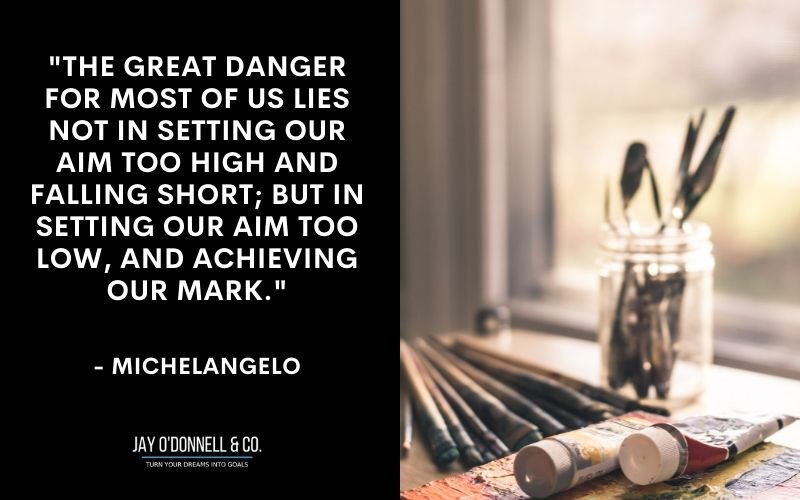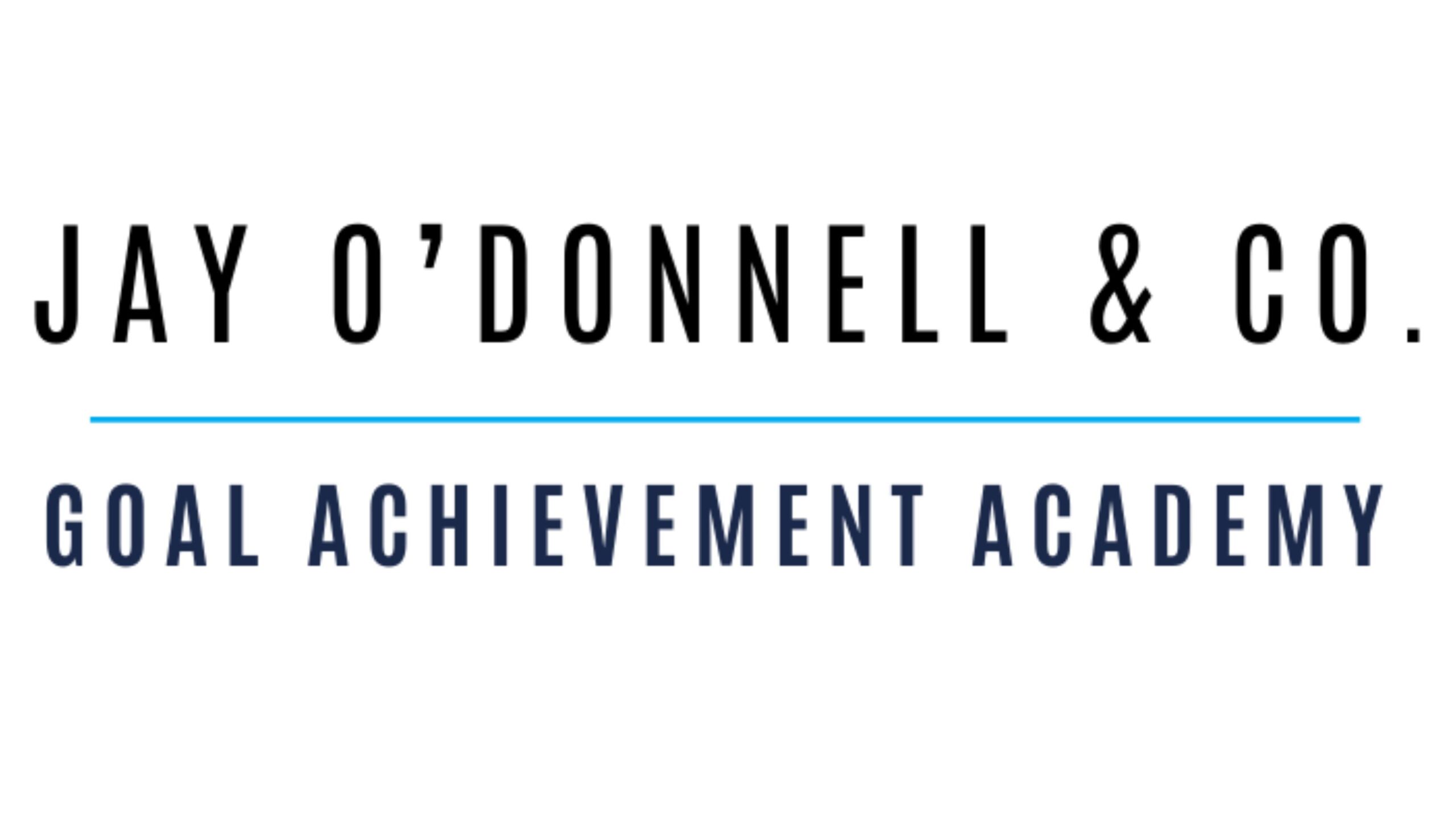How to organize your life with a notebook, in 12 simple steps.
A lot of people don’t realize this.
But organizing your life with a notebook is a totally doable process.
In fact, notebooks are highly underrated as tools to help us create the life we desire.
I’m a firm believer in turning your dreams into goals, writing those goals down, and creating a roadmap to success.
And one of the biggest differences between people who succeed in life and those who don’t is simply this:
The overwhelming majority of people who succeed at the things they want to achieve do so by writing down a plan (their goals) on a daily basis and sticking to it.
Planning is really everything.
Writing down your goals is how you focus on the things that matter the most.
And while there are plenty of amazing goal achievement systems and goal planners out there, the fact remains that a simple notebook is more than enough to help you turn your dreams into reality.
So in this post, we’re going to dive deep into answering the question:
How to organize your life with a notebook.
The following 12 steps will help you with the process of turning your dreams into goals, writing those goals down, and creating a literal roadmap to success—using only a simple notebook for a framework.
Let’s dive into it.
12 Steps – How To Organize Your Life With A Notebook
1. Buy An Awesome Notebook

Of course, in order to organize your life using a notebook, you’re going to need to purchase a notebook that’ll work for you.
Ideally, you’ll want to choose something that is both functional and that inspires your creativity.
One of the advantages of using a notebook for this process is that notebooks tend to be a lot less expensive than dedicated goal planners.
In fact, if you go to your local retail store, you can probably find one for less than $5. (In some cases, you can find one for less than $1!)
Plus, there’s a wide range of different types of notebooks to choose from.
You can choose a blank notebook (like a sketchpad) and take complete creative control of the process.
Or, you can buy a notebook with lines and/or bullets (dots) so that you have a geometric framework to work from for writing things down and creating lists.
Personally, I would recommend that you head to your nearest retail store, thumb through the notebook section, and just see which ones stand out to you as feeling more creative and inspirational.
Choose one that feels great, that looks great, and that makes you excited to think about opening it up on a daily basis.
Once you’ve found your notebook, you’re going to need something special to write with.
2. Get Something To Write With
This may not seem like it should be a major detail.
But it is.
When you choose a writing utensil that feels great in your hand, great on the page, and creative to the touch, you’re going to be that much more excited to put pen to paper to write down your goals.
And that will give you a powerful advantage.
So make the most of it, and grab some awesome stuff to write with.
Personally, I’m a huge fan of fountain pens. I feel like there’s nothing quite as inspirational or creative as sitting down with a beautiful fountain pen and writing down my goals for the day.
With that being said, there are all kinds of different types of writing utensils to choose from.
If you need some inspiration for this, check out this awesome goal-setting accessories list that we created specifically for this topic.
In any case, find yourself some writing utensils that work for you.
This could be a fountain pen, a gel pen, some colored markers, some mechanical pencils, or even a dip pen.
This is totally up to you.
Once you’ve secured the perfect writing utensil, you’ll be ready to get started.
3. Start By Organizing Your Days
One of the disadvantages to using a notebook as a planner, as opposed to a dedicated goal planner, is that there’s really no guidance to start with.
But hey, that’s why you’re reading this guide, right?
Don’t worry—I’ll help you out!
Getting started can be an overwhelming process.
So I always recommend that people start with the most important, simplest thing first.
Start out by just organizing your day.
Schedule yourself 10 minutes in the morning, before doing anything else, and plan out the day’s activities.
The more specific and detailed you can get with this, the better.
But it doesn’t have to be perfect.
At first, don’t be afraid to start simple.
Start by writing down the most important tasks you need to accomplish today.
Then, you can write down timelines for how you’d like your day to be structured.
You can block out times for work, important household tasks, errands you need to run, projects you’d like to get accomplished, etc.
One thing that you’ll quickly notice is that when you organize your tasks and block out specific timeframes for those tasks, you’ll cut down on wasted time spent in between.
This is kind of like creating small mini-deadlines for yourself to get your daily tasks accomplished.
This is a powerful daily goal-setting principle that’ll actually really help you to get more accomplished on a daily basis.
A notebook works perfectly for this.
This is why this is such an important step.
If you don’t write it down (your daily task/goal), it’s just less likely to materialize.
Plus, as you get things done, you can go back to your notebook and check them off.
This will give your brain powerful boosts of reward chemicals that’ll further motivate you to get even more done as the day progresses.
Need some additional information for organizing your life and getting all of the important stuff in order?
Read this guide: A Complete Guide To Getting Your Life In Order.
One Final Tip: Use The Premack Principle
If possible, start with your most challenging tasks first, and then work your way down toward the least challenging/funnest tasks.
Some people describe this as ‘eating the frog.’ Others call it the ‘Premack Principle.’
This helps you to snowball momentum and to utilize the earlier parts of the day to knock out those tasks that’ll require more energy.
This saves you from wearing yourself out on smaller tasks and then getting overwhelmed at the bigger ones.
4. Write Down Your Appointments

When learning how to organize your life with a notebook, you’ll quickly become aware of the fact that notebooks make amazing appointment/calendar tools.
Of course, notebooks don’t contain dates or times.
You’ll need to fill these in yourself.
However, once you perfect your own technique for how to do this, you’ll quickly level up your ability to keep your appointments and be on time for the things that matter.
This is really important for life organization.
So for best results, start deploying this technique in your notebook goal-setting habits as quickly as possible.
Write down your appointments not only for today, but also for the future.
When you write them down in your notebook (even just a week or two in advance), this helps your brain to understand that there are high-priority appointments coming up in your schedule.
This will help you to remember them.
Missing appointments and showing up late to important events is a primary danger, and it can definitely pose a threat to your overall life success.
Missed opportunities, missed appointments, and schedule setbacks can really cause a negative spiral in your life.
These things can cause you to lose your job, miss out on promotions, and keep you from taking advantage of infrastructures in your life (medical appointments, therapy appointments, planned activities with loved ones etc.) that have the capacity to really add value and increase your happiness, satisfaction, life-quality, and fulfillment.
You have everything to gain by being meticulous with writing out your appointments, and everything to lose by neglecting them.
5. Start Writing Down Your Future Plans
Once you get a little bit more comfortable with writing out daily to-do lists and appointments, it’ll be time to move on to the next step.
When learning how to organize your life with a notebook, you’re going to discover that this process can get as deep and as specific as you want to make it.
And for best results, you should try to make it as specific as possible.
This includes writing out your future plans for your life.
Successful people all have a few things in common—and one of them is that they tend to have a concrete, specific vision for what success looks like for them.
You can do the exact same thing and deploy the exact same success principles using only a notebook.
How Do You Write Down Your Future Plans Using Just A Notebook?
Great question.
Start out by flipping forward in your notebook, and write down some kind of heading that designates that this area is going to be used for mapping out future plans.
Title it by writing something like ’future plans,’ ‘my future goals,’ or ‘my vision for the future’ at the top of the page.
Next, just start writing down the things you’d like to achieve for yourself.
This could include something like increasing your income, getting a certain job, buying a house, getting married, having children, accomplishing some kind of project, starting your own business, achieving a specific weight loss or fitness goal, etc.
The sky is the limit.
But the idea here is to just get these things out of your imagination and down onto paper.
Need some additional resources for guidance? Read this guide: 17 Powerful Goal Tips – How To Succeed At Your Dreams.
You can also learn more about writing about your future in this guide: Writing About Your Future Plans – A Complete Guide.
Need some inspiration about dreaming big and finding your purpose in life? Read this guide: 12 Steps To Finding Your Passion And Purpose In Life.
This is the very first step to accomplishing your future goals in the real world.
You can create a plan of action for these things at a later time.
But at first, the goal is to just start writing them down and create a sort of vision board for what you’d like to accomplish.
6. Identify Problem Areas And Start Organizing Them

As you go through life, you’re probably going to become aware of specific areas that seem especially disorganized, chaotic, and messy.
These are the parts of your life that probably bring you the most distress and discouragement.
If there are specific parts of your life that you really feel like you’re falling behind in, then it may be in your best interest to focus specifically on these areas first, to make a plan to organize them and get them under control.
The great news is that a notebook can also work perfectly for this process.
However, figuring out how to identify these problem areas and fix them can be challenging.
As a general rule, here’s the process you’ll want to follow for getting started on this.
How To Fix Disorganized Parts Of Your Life
Step 1: Identify the problem.
Step 2: Do some research to figure out where it’s going wrong.
Step 3: Be honest with yourself.
It’s highly likely that you’re going to have to change your behaviors in order to get this part of your life back on track.
Be willing to accept that you probably need to learn to behave a bit differently in regard to this specific area of your life in order to improve it.
Step 4: Make a plan to get that part of your life back on track.
Step 5: Write out specific goals in your notebook that’ll empower you to succeed at this plan in achievable steps.
Step 6: Stick with your plan.
Work on it every day. Keep writing down your goals, and never give up.
If you follow this basic framework in your quest to fix problem areas in your life, you’ll quickly start to knock out the problems and replace them with solutions.
This will feel great and motivate you even more.
7. Write Down Your Goals Every Morning
This step is true regardless of whether you’re trying to learn how to organize your life with a notebook, or have decided to use an actual goal planner to accomplish your dreams.
This one is pretty simple, but it does require some discipline.
Write down your goals (daily goals and long-term goals) every single morning.
The exact method that you use to do this can be very creative and open-ended.
You may just write down your to-do list, or you may write down all of your appointments.
Or you may just write down the most important tasks, and then review your appointments in your notebook for the day.
I would also strongly recommend writing down your most important future goals every day as well.
This will really help you to get (and stay) focused on the things that matter.
Sticking with this habit every single day will lead to greater focus and better results over time.
It may not seem like that big of a deal.
But it actually is.
Stick with it and don’t give up.
8. Write Journal Entries At Night
Writing down your goals in the morning is a fantastic way to start the day.
However, when you’re learning how to organize your life with a notebook—remember that one of the benefits of using a notebook is that it’s completely open-ended.
This means that you can also use it to write journal entries.
There are many benefits to using a journal to write down your thoughts and feelings.
So for best results, choose a section of your notebook, label it ‘journal entries,’ and then spend just a couple of minutes writing in it every night before you go to bed.
It can help with sleep, but it can also help you to celebrate your wins and reflect on the losses that you experienced that day.
This can also help to prepare your mind to get ready for a peaceful night’s sleep, while also helping you to plan the next day’s activities and start fresh with another cycle.
For more guidance on how to start a journaling habit in your life, read this post: How To Start Journaling – An In-Depth Guide For Beginners.
9. When You Use Up A Notebook, Keep It For Future Reference

If you stick with these plans, and you go through the steps as I’ve outlined them in this guide, you’re going to use up your notebook pretty quickly.
This is actually a great problem.
It means that you’re spending a significant amount of time every day writing down your goals, organizing your days, filling out journal entries, and reflecting on your dreams for your life and how you can plan to succeed at them.
This is amazing.
And once you completely fill up a notebook, you should give yourself a pat on the back and consider it a huge victory.
Next, file that notebook away in a protected area where you can access it later.
Buy yourself a new notebook, and start the process over again.
You’ll be amazed at how your goal-setting and journal-keeping habits will evolve as you move from notebook to notebook.
This is a normal part of the process, and is one of the awesome things about a consistent goal-setting habit.
Plus, as we’ve already talked about, the fact that you’re using a notebook for this makes the process completely creative and open-ended.
You’re truly beginning a habit that has the power to help you organize and transform your life in amazing ways.
So stick with it, and don’t give up.
Speaking of habits…
10. Stay Consistent
One of the more difficult things about organizing your life, writing down your goals every day, and keeping journal entries is the fact that it requires a certain amount of consistency.
And let’s be honest…
Humans aren’t always good at staying consistent.
We tend to get distracted pretty easily.
Don’t Skip Your Daily Goal Setting Habit! Here’s Why
We also tend to get bored of tasks that require us to do repetitive things.
Organizing your life, journaling, and writing down your goals can sometimes feel like boring tasks.
They can also very easily feel like tasks that would be okay to skip for a day or two.
But try to resist these temptations.
The reason for this is simple.
When you make goal setting a consistent daily habit, you’re going to reap maximal rewards for your effort.
On the flipside, if you neglect the habit, you’re highly likely to drop it altogether.
And then, you won’t reap any of the amazing long-term benefits that goal setting has to offer.
So staying consistent with the habit on a daily basis is really important.
Need some extra help with the ‘habit’ part of the equation? Check out this guide: How To Make Goal Setting A Habit In Your Life.
11. Don’t Give Up

As you strive to turn your dreams into goals and accomplish those goals in your life, you’re doubtlessly going to be met with some difficulties.
- You’re going to face challenges and setbacks.
- You may even face failure.
Goal setting isn’t a magic bullet for fixing all of your problems.
It’s a tool that you can use to get focused and motivated to stick with the plan and accomplish your goals—one step at a time.
With that being said, you’re probably going to feel like giving up at least once or twice over the course of your journey.
You may even feel like giving up at least once per week, or even once a day.
But this is pretty normal.
It’s pretty normal to get discouraged when you have big goals.
You’re trying to accomplish big things!
So just try to stick with it, and remember that this is all part of the process of growing and becoming a stronger, better, more capable person.
Don’t give up on your goal-setting habit.
Keep buying those notebooks, organizing your life, filling them up, and filing them away.
One day, once you’ve succeeded at all of your wildest dreams, you’ll look back, reflect on them, and be grateful that you went through all that hard work to organize and create the life you wanted for yourself.
It really matters.
Success is completely possible.
And goal-setting, even with a normal notebook, is a powerful tool for helping you to accomplish it.
Need some extra motivation for those tough days? Check out this guide: 3 Things To Do When Achieving Goals Isn’t So Easy.
12. Keep Learning And Adapting
As you move forward in the process of learning how to organize your life with a notebook, it’s in your best interest to study the techniques used by other successful people as well.
For example, you may want to watch some YouTube videos, read some books, or listen to podcasts created by people who’ve succeeded at what you’re trying to accomplish—and glean some tips, tricks, and advice from them to help you on your own journey.
Leveling up in our education, especially when it pertains to crucial habits like goal setting, is incredibly important.
And it’s never a waste of time.
So keep learning.
Your Goal Setting Habits May Change Over Time
Another thing you’re going to realize is that over time, your goal-setting habits are probably going to evolve. And that’s totally fine.
You shouldn’t resist the urge to change your goal-setting style or technique.
Give it a try.
See what works best for you.
And don’t be afraid to change it up if you feel like it.
Resist the temptation to be ‘rigid’ in your behavior patterns, as this will just lead to boredom – tempting you to quit.
The most important thing is that you wake up every day staying consistent with writing down those daily goals and long-term plans.
As long as your habit is causing you to stick with this pattern on a consistent basis, it’s probably doing some serious transformative work in your life.
It’s really worth it.
Don’t give up.
Need An Upgrade? Consider Buying A Goal Planner System
If you get to the point where you feel like you may be ready to upgrade to an official goal planner system, check out this resource page.
You’ll find a list of our favorite planners available on that page, as well as a list of amazing accessories you can buy to aid you in your goal-setting journey.
Personally, I’m a big fan of the Best Self SelfJournal for people who are just getting started with goal setting.
For those who are a bit more experienced, who want to level up in the process a bit more (especially where fleshing out long-term goals is concerned), I would recommend the Full Focus Planner.
But there are all kinds of amazing planners available.
And as I often say—the specific planner system you use doesn’t matter nearly as much as just choosing a system and committing to writing down your goals.
This is why I believe that a notebook can suffice perfectly well, especially if it ends up being well suited to your particular creative preferences.
In other words, do what works best for you.
Just make sure that you’re writing down those goals every day, and writing down and reviewing those long-term goals on a daily basis as well.
In Conclusion
Hopefully, this post has given you some serious information about how to organize your life with a notebook that’ll help you in your goal-setting and life-success journey.
Of course, at the end of the day, this is just another part of the larger, overarching process of turning your dreams into goals, and writing those goals down to create a roadmap for success in your life.
This is how you begin your journey to success and crush it.
Need some help? Want to start with something a bit more ‘guided’ than a blank-slate notebook? Download my weekly goal-setting sheet, print out a few, and give it a try.
You can also sign up for my email list to get a free copy of my Goal Setting Essentials Starter Kit.
You’ve got this. I believe in you.
Now it’s time to get to work.
Best wishes…
Jay O’Donnell

